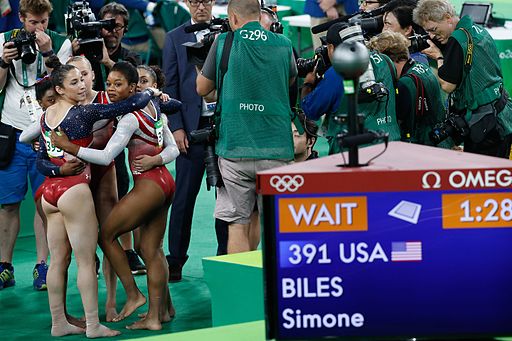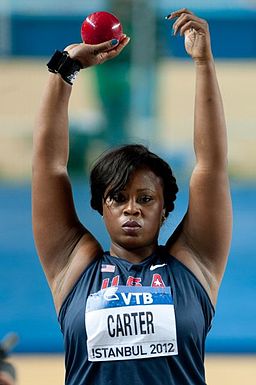Photo: Agência Brasil Fotografias, via Wikimedia Commons
The Olympics are a helluva lot more thought-provoking in thinkpieceland, and in my corner of the internet, that means looking at gymnastics with a critical eye. There’s been fantastic commentary on gymnastics and femininity from Chloe Angyal, The Cut, and Stuff Mom Never Told You—all of whom take a more comprehensive view than I do here—but I’ve spent too much time watching the Olympics for me to not put my two cents in. (Otherwise I’ll have to admit that I am painfully basic when it comes to the Olympics, developing acute agita over sports I have given zero thought to for four years—steeplechase?!—and to form allegiances to athletes for no reason other than I want to visit their home nations. Dmitriy Balandin’s gold medal in the 200-meter breaststroke saw me leaping to my feet and chanting KAZ-AKH-STAN!!! like a...like a Kazakh. Anyway.)
Angyal has pointed out that the visible girlishness of gymnastics has risen along with its athleticism, its makeup and glitter ticking up in tandem with the musculature of the athletes over the years. Makeup is also a part of what we’ve come to think of as gymnastics behavior. Which is to say, girlish behavior. Hugs all around every time a competitor comes back to the sidelines, high-toned assurances, pats on the back, the occasional squeal, that pitch-perfect confidence mixed with the grateful humility we ask of our Olympians. The drive, focus, and passion to pursue a goal, embodying a form of American girlishness that’s admirable to feminist types such as myself. Add to that the contemporary accoutrements of gymnastics—the Swarovski crystal leotards, the pert ponytails, and, yes, the makeup—and it seems that our quintessential gymnast isn’t just visually encoded as feminine, she’s the ideal American girl. She’s pretty, nice, well-behaved, and disciplined, and she kicks international ass. (It’s worth noting here that gymnastics is one of the few sports where, absent a gender modifier, the athlete is presumed to be female.)
Which brings us to Gabby Douglas. It’s upsetting to read about the hatred directed toward her, which turns nauseating once race is inevitably brought into it. At the same time, I did notice that she didn’t put her hand over her heart during the national anthem; I did notice that she wasn’t visibly rushing to congratulate teammates who had fared better than she in these Olympics. I didn’t draw conclusions about Douglas or her character by it, but I noticed. And the reason I noticed was because she was different than the other competitors. More reserved, less bubbly. More observant, less indulgent. More—forgive me, but this is the word that comes to mind—womanly, less girlish, even as I know plenty of effervescent adult women and have witnessed reserved teen girls aplenty.
Douglas’s reserve shouldn’t become a point of attack on her in the least; she’s a remarkable athlete, and I’ve seen only graciousness from her off the floor. But her demeanor was that of an outlier from the expected form of femininity in this context. I don’t think Gabby Douglas would be facing this vitriol were she, say, a track and field competitor. It’s the image of the contemporary gymnast that’s at issue here, and to me, that’s where the makeup comes in too. Gymnasts “need” makeup to be in accord not only with femininity and to soften the image of their athleticism, but to be in accord with the image and behavior of a gymnast. That’s where Douglas “fails,” if you want to call it that—the behavior part—and that’s where she’s being punished. Other gymnasts who have “failed” here include McKayla Maroney and Aliya Mustafina. Both of them were roundly whipped on social media, but neither to the degree that Douglas has been, and yep, race is the differentiating factor here. It’s one thing to be called a diva, or to have your “not impressed” face go viral, but their whiteness was a buffer from the vitriol Douglas has received. Race is unquestionably an enormous factor here, and in ways that are intertwined with reserve and expression, as this piece,“Gabby Douglas and the Right to Be Visibly Disappointed,” points out—and also intertwined with appearance and beauty standards, including, of course, black athletes’ hair.
Makeup in the realm of gymnastics doesn’t just “soften” the incredible athletic power of American gymnasts, though. It reinforces their girlish, bubbly image. This piece on gold-medal-winning shot putter Michelle Carter demonstrates that: “For a couple of years, being professional, I kind of questioned myself. Should I wear my false lashes or take the time I want to take so I can feel good when I go out on the field?” the athlete and certified makeup artist said in The New Yorker. “Because nobody else was really doing that. And I thought, No: I’m not going to change what I believe I should look like to fit anybody else’s standards. I believe if you look your best, you’re going to feel your best, you’re going to do your best.”
Michelle Carter. Photo: Erik van Leeuwen, via Wikimedia Commons
If we truly required all our female athletes to use makeup as an apology for their strength, shot putters would “need” that styling even more than gymnasts because of their incredible power and heft. But as Carter says, it was a bold move for her to sport her look—false eyelashes, winged liner—in competition. Makeup becomes political for Carter because it’s showing that female athletes can look ferociously powerful and still wear a fierce lip if they desire, and will be taken seriously either way. Carter’s makeup is a statement not of adherence to femininity but of the diverse ways one can be a woman: A full face of makeup runs counter to our ideas of force and power, like the strength required to hurl a metal ball 20 meters with the force of a cannonball. You’d think that would mean that culturally female shot-put athletes would be required to “compensate” by feminizing themselves with makeup, but that’s not the case. It’s the marriage of an artistic sport and the sex of the competitor that sees makeup be de rigueur in gymnastics yet outlying in shot-put. The expectation of feminine expression is different for each type of sport, and that expression remains even when makeup is taken out of the equation. Douglas’s looks didn’t escape rebuke, of course, but those who vilified her primarily did so because she didn’t behave like the ideal girl.
Olympics aside, the ways we’re seeing gender expectations play out illustrate another problem I keep running into with theorizing makeup. Until we divorce makeup from conventional femininity and the expectations attached to it, we won't really know what we think about makeup as opposed to what we think about womanhood itself. If men wore lipstick in numbers as great as women, would people who find makeup a waste of time or an exercise in vanity still feel the same way? They might; historically, such men have been seen as foppish, even when they weren’t unusual. But just as likely, we might reevaluate makeup in a different light, seeing it for its possibilities instead of its limitations, or as an expression of character as opposed to an expression of traits associated with one gender. (Or of gender, period, for that matter.)
I think about the extraordinarily careful line these young women have to walk, so publicly, and under such intense pressure. (This goes double for Simone Biles, who has probably learned some sad, quiet lessons from watching how Douglas has been treated for being an outstanding black girl in a historically white sport. Can you imagine the vitriol if Biles, largely acknowledged as the best gymnast who has ever lived, had the gall to not only be the best in the world but to not appear kind and gracious and perfectly girlish at every moment?) I keep watching the faces of each gymnastics team member, waiting for that telltale twitch that reveals the fierce competitive spirit that accompanies being a world champion—I mean, here they are, competing against one another for something they’ve been dreaming about since second grade, and you tell me they’re always full sweetness and support? I still haven’t seen their faces betray them, and I don’t know whether that’s because they’re really good actresses, or because they’ve had to learn to reconcile their genuine wish to support one another with their genuine wish to win, or because they’ve developed the kind of grace that means they don’t even see those desires as being at odds with each other. I suspect it’s probably all of those reasons, and more. It takes a triple-backflip-dismount level of grace to appear as noncompetitive in a competitive environment as remarkably as these athletes do. Their ability to land it every time one of them ousts the other for first place or for a spot in the finals showcases and elevates that new ideal of femininity. Which means that every time one of them falls outside of that ideal, even for a moment, they have even farther to fall.

